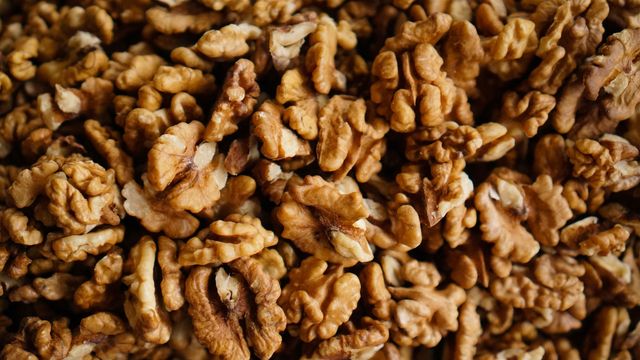The heart health benefits of walnuts may come from favorable changes in the mix of microbes found in our gut, according to a new study led by Kristina S. Petersen from Texas Tech University. Incorporating walnuts into a person’s diet could alter the microbiome in a way that increases the body’s production of the amino acid L-homoarginine, associated with a lower risk of cardiovascular disease. The study used metatranscriptomics to analyze gene expression and the bacteria in the gastrointestinal tract from fecal samples collected from participants on different diets. They found higher levels of Gordonibacter bacteria in the gut of participants on the walnut diet, which converts plant polyphenols into metabolites that allow them to be absorbed by the body. Moreover, participants consuming the walnut diet showed higher levels of expression for several genes involved in important metabolic and biosynthetic pathways. The research could eventually help inform dietary interventions based on walnuts and similar supplements.
Heart Health Benefits of Walnuts Likely Come From the Gut
Recent research has found that the heart health benefits of walnuts may be related to beneficial changes in the mix of microbes found in the gut. The study led by Kristina S. Petersen from Texas Tech University, Lubbock, examined the gene expression of gut microbes and found that incorporating walnuts into a person’s diet may alter the microbiome in a way that increases the body’s production of the amino acid L-homoarginine, which has been linked to a lower risk of cardiovascular disease.
The researchers used metatranscriptomics, a recently developed technology, to study the gene expression levels of gut microbes. They monitored how these levels shifted in response to various conditions such as dietary changes. The study analyzed samples from a previously conducted controlled-feeding study where 35 participants with high cardiovascular risk were put on a two-week standard Western diet and then randomly assigned to one of three study diets. The participants followed each diet for six weeks with a break between each.
Mansi Chandra, an undergraduate researcher at Juniata College, Huntingdon, Pennsylvania, said that “research has shown that walnuts may have heart-healthy benefits like lowering cholesterol levels and blood pressure. This motivated us to look at how walnuts benefited the gut microbiome and whether those effects led to the potential beneficial effects. Our findings represent a new mechanism through which walnuts may lower cardiovascular disease risk.”
The study’s findings could be significant in identifying other foods or supplements with similar nutritional benefits. Moreover, it is the first study to use metatranscriptomics analysis to study the impact of walnut consumption on gut microbiota gene expression. The researchers believe that these exploratory analyses contribute to our understanding of walnut-related modulation of the gut microbiome, which could be very impactful in learning how gut health impacts our heart health in general.
Chandra is set to present the new findings at the annual meeting of the American Society for Biochemistry and Molecular Biology, Discover BMB, from March 25 to 28 in Seattle.
Walnuts May Benefit Cardiovascular Health Through Their Effect on Gut Microbes
Researchers have discovered that incorporating walnuts into a person’s diet could have heart health benefits due to their bioactive compounds and ALA content, as well as favorable effects on the mix of microbes found in our gut. The study was led by Kristina S. Petersen from Texas Tech University, Lubbock, and examined how walnuts impacted cardiovascular health, and whether walnut ALA is the best substitute for dietary saturated fat compared to oleic acid.
The study included three diets, each one followed for six weeks with a break between each: one that incorporated whole walnuts, one that included the same amount of omega-3 fatty acid alpha-linolenic acid (ALA), and polyunsaturated fatty acids as the walnut diet but without walnuts, and one that partially substituted another fatty acid known as oleic acid for the same amount of ALA found in walnuts but without consumption of any walnuts.
The researchers used metatranscriptomics to analyze gene expression and the bacteria in the gastrointestinal tract from fecal samples collected shortly before the participants finished the run-in diet and each of the three study diets. The analysis revealed higher levels of Gordonibacter bacteria in the gut of participants on the walnut diet, which converts the plant polyphenols ellagitannins and ellagic acid into metabolites that allow them to be absorbed by the body.
Moreover, participants consuming the walnut diet showed higher levels of expression for several genes that are involved in important metabolic and biosynthetic pathways, including ones that increase the body’s production of the amino acid L-homoarginine, linked to a lower risk of cardiovascular disease. Although more work is needed to confirm these observations, the research could eventually help inform dietary interventions based on walnuts.
Mansi Chandra, an undergraduate researcher at Juniata College, Huntingdon, Pennsylvania, said, “Since a lot of people are allergic to nuts, these findings also suggest that other food supplements that boost the endogenous production of homoarginine may also be helpful.”
The researchers would like to apply metabolomic and proteomic analyses to identify the final products of the genes that showed higher levels of expression to better understand the biological mechanisms at work.
Don’t miss interesting posts on Famousbio









